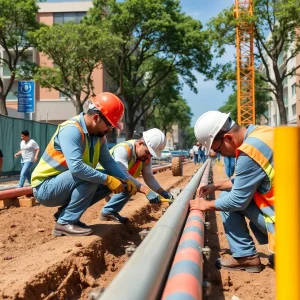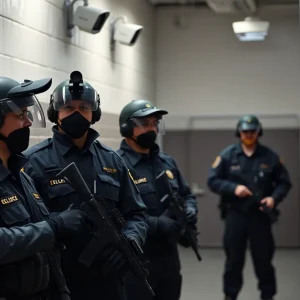U.S. Troop Deployment to Israel Amid Ongoing Conflict
Jerusalem – The United States has announced it is sending approximately 100 U.S. troops and one of its most advanced missile defense systems, known as THAAD (Terminal High Altitude Area Defense), to Israel. This deployment comes as hostilities in the Middle East escalate, particularly in response to the ongoing war in Gaza that has dramatically intensified in the past year. This marks the first significant deployment of U.S. military personnel to Israel since the war began.
Context of the Deployment
The move arrives just weeks before the U.S. presidential election, where U.S. involvement in the Middle East has become a polarizing topic among voters. The deployment is seen as an indication that the U.S. expects an Israeli attack on Iran to be imminent. U.S. officials have advised Israel to avoid targeting Iran’s critical infrastructure, such as its nuclear and gas sites, out of concern that these actions could provoke a broader conflict that would disrupt the global economy.
Military and Political Implications
According to Aaron David Miller, a Middle East expert, the U.S. is anticipating that Israel’s attack on Iran will be “so comprehensive that the Iranians will have to respond.” Since the war began last October, the U.S. has sent over 50,000 tons of military supplies and equipment to Israel. Defense Minister Yoav Gallant of Israel has vowed to carry out a powerful response against Iran following its missile attacks on Israel on October 1.
Gallant stated, “Our strike will be powerful, precise, and above all — surprising. They will not understand what happened and how it happened.” This remark highlights the potential for escalating violence in the already tense region.
The THAAD System and Its Purpose
The THAAD system is specifically designed to intercept and destroy short-, medium-, and intermediate-range ballistic missiles. It consists of truck-mounted launchers capable of carrying up to eight missiles each. The Pentagon’s spokesperson, Pat Ryder, explained that this deployment aims to enhance Israel’s air defense capabilities. He also emphasized the U.S.’s commitment to defending Israel and protecting American personnel in the region from further missile attacks.
Divided American Political Landscape
The conflict in Gaza has deeply divided political opinions within the U.S. Both Vice President Kamala Harris and former President Donald Trump have expressed strong support for Israel. However, younger voters and Arab American communities have criticized Harris for failing to call for restrictions on arms to Israel, especially given the death toll of over 42,000 in Gaza amidst ongoing military operations.
On the Republican side, criticism has also emerged against the Biden administration for its comments regarding Israel’s military strategies following the attack by Hamas that resulted in around 1,200 Israeli fatalities on October 7, 2023.
Potential Risks and Concerns
The deployment of U.S. troops increases the risk of American casualties. Experts warn that if Iranian missiles were to strike U.S. personnel or if pro-Iran militias in Iraq or Syria act against U.S. forces, there is a strong possibility the U.S. might retaliate against Iran.
Harrison Mann, a former U.S. Army officer, highlighted concerns about the safety of U.S. soldiers operating THAAD in Israel, stating, “Those soldiers will be operating from Israeli military bases, which Iran has shown it can strike.” This emphasizes the precarious situation U.S. troops are entering.
Historical Context of the Israel-Palestine Conflict
The ongoing conflict, sparked by Hamas’s assault and the subsequent Israeli military response, has roots that go back decades, fostering deep mistrust and violence. The war in Gaza has led to some of the largest-scale displacement in the region since the establishment of Israel in 1948.
With the situation remaining tense, both the U.S. and Israel are acutely aware of the potential for significant escalation, not just bilaterally but possibly extending throughout the Middle East. The U.S. hope is that by reinforcing Israel’s defense, they can mitigate further risks while navigating the complex landscape of political relations that influence these precarious alliances.


























